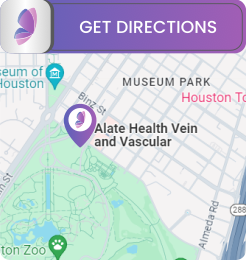Uterine Fibroids Embolization Treatment Clinic Q&A
Uterine fibroid embolization (UFE) is a minimally invasive treatment aimed at shrinking fibroids located in the uterus. Andrew Doe, MD, at Alate Health Interventional Radiology Clinic, provides Uterine fibroid embolization (UFE) for faster recovery, minimal blood loss, and potentially preserves your fertility. This treatment may be recommended for patients who prefer a non-surgical option to manage their fibroid condition. To learn more about uterine fibroids embolization treatment, contact us today or book an appointment online. We are conveniently located at 1213 Hermann Dr Suite 255, Houston, TX 77004.




Table of Contents:
What is uterine fibroid embolization?
Does uterine fibroid embolization really work?
What is the success rate of uterine fibroid embolization?
How long does uterine fibroid embolization last?
Uterine fibroid embolization (UFE) is a minimally invasive treatment aimed at shrinking fibroids located in the uterus. During this procedure, a specialist at Alate Health Interventional Radiology Clinic uses a catheter to deliver small particles directly into the arteries supplying the fibroids.
These particles block the blood flow to the fibroids, leading to their reduction in size and the alleviation of associated symptoms such as heavy bleeding and pelvic pain. This treatment may be recommended for patients who prefer a non-surgical option to manage their fibroid condition.
The procedure typically involves the insertion of a catheter through a small incision. Advanced imaging techniques subsequently guide the catheter to the uterine arteries. Once positioned correctly, embolic agents are injected to obstruct the fibroid’s blood supply effectively. UFE is highly effective at preserving the uterus and significantly reduces recovery time compared to conventional surgeries, making it an excellent option for many women.
Uterine fibroid embolization does really work and is an effective option for many patients. Uterine fibroid embolization has been demonstrated to be highly effective in reducing the symptoms of fibroids, such as pain and excessive menstrual bleeding.
The procedure is particularly beneficial for women who wish to avoid more invasive surgical interventions. Many patients experience significant symptom relief shortly after the procedure, with the majority maintaining these improvements over time.
The non-surgical nature of UFE also means less time in the hospital and a quicker return to daily activities, which makes it much easier for individuals to fit into their busy schedules. The procedure not only helps shrink the fibroids but also contributes to an overall improvement in the quality of life.
While individual results can vary, UTE is typically associated with a high success rate at helping provide swift and lasting symptom relief.
Individual success with uterine fibroid embolization will vary depending on a range of specific circumstances. However, the success rate is reportedly high according to various studies and trials indicating that about 80% to 90% of women who undergo the procedure experience significant symptom relief.
This high success rate makes UFE a viable alternative to more invasive surgical options and is particularly beneficial for women who wish to preserve their reproductive organs. The effectiveness of UFE in reducing fibroid size and improving symptoms has been well-documented across various clinical settings.
Additionally, the long-term outcomes associated with UFE are generally positive, with many patients maintaining symptom relief for years following the procedure. However, as with any medical treatment, the specific results can vary based on individual factors such as the size, number, and location of the fibroids, and suitability for the treatment will be evaluated on an individual basis.
Regular follow-up with healthcare providers ensures that any changes or recurrence of symptoms are managed promptly.
The duration of symptom relief following uterine fibroid embolization can vary, but many women enjoy sustained benefits for several years after the procedure. The longevity of the results depends largely on factors like the initial size and location of the fibroids.
Typically, once the fibroids have shrunk, they do not return to their original size, providing long-term relief from the symptoms that initially necessitated treatment. Recovery from UFE is relatively quick, with most women able to resume normal activities within a week or two.
The non-surgical nature of the procedure minimizes the risks associated with more invasive operations, and most patients can expect to return home the same day or after a short overnight stay in the hospital. Regular follow-ups and monitoring are essential to assess the effectiveness of the treatment and to manage any potential recurrence of symptoms.
Uterine fibroid embolization is available at Alate Health Interventional Radiology Clinic. Contact us today for more information or book an appointment online. We are conveniently located at 1213 Hermann Dr Suite 255, Houston, TX 77004. We serve patients from Houston TX, Bellaire TX, Jacinto City TX, Spring Valley Village TX, Stafford TX, Bunker Hill Village TX, and surrounding cities.
Watch our informational video about our Uterine Fibroid Embolization (UFE) service
Check Out Our 5 Star Reviews


Additional Services You May Need
▸ Adenomyosis
▸ Enlarged Prostate
▸ Leg Ulcers
▸ Joint Pain
▸ Varicose Veins
▸ Uterine Fibroids
▸ Pelvic Congestion
▸ Vascular Malformations
▸ Dialysis/Renal Failure
▸ Port and PICC Placements
▸ Peripheral Arterial Disease
▸ Primary and Metastatic Liver Cancers
▸ Hemorrhoid Artery Embolization (HAE)







